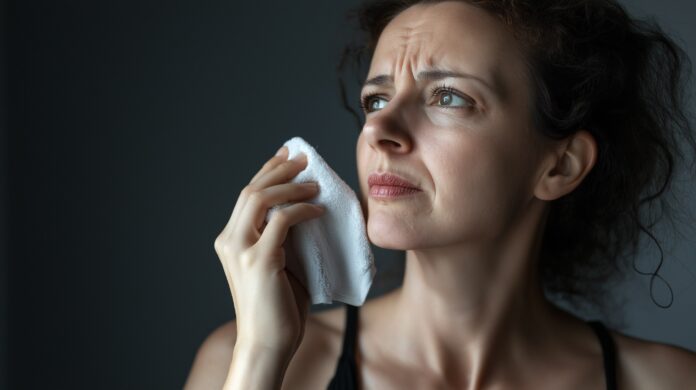Introduction
Overview of Menopause and Perimenopause
Menopause is a natural biological process that marks the end of a woman’s menstrual cycles, typically occurring between the ages of 45 and 55. It is diagnosed after 12 consecutive months without a menstrual period. The transition to menopause, known as perimenopause, can begin several years before menopause itself. During this time, the ovaries gradually produce less estrogen, leading to various physical and emotional changes. Perimenopause is characterized by irregular menstrual cycles, hot flashes, night sweats, and mood swings. These symptoms are a result of fluctuating hormone levels, particularly estrogen and progesterone. As women move from perimenopause to menopause, these hormonal changes can have a significant impact on various bodily functions, including vaginal health.
Common Bodily Changes During Menopause
Menopause brings about a myriad of changes in a woman’s body, many of which are directly tied to the decrease in estrogen levels. Some of the most common changes include:
- Hot Flashes and Night Sweats: Sudden feelings of heat that can cause sweating and discomfort, often disrupting sleep.
- Vaginal Dryness: Reduced estrogen levels can lead to thinning and drying of the vaginal walls, causing discomfort and pain during intercourse.
- Weight Gain: Hormonal changes can slow down metabolism, leading to weight gain, particularly around the abdomen.
- Mood Swings: Fluctuating hormone levels can affect neurotransmitters in the brain, leading to mood swings, irritability, and even depression.
- Bone Density Loss: Decreased estrogen can lead to a reduction in bone density, increasing the risk of osteoporosis.
Importance of Understanding Vaginal Odor Changes
One often overlooked but significant change during menopause is the alteration in vaginal odor. While it may be an uncomfortable topic, understanding the reasons behind these changes is crucial for maintaining vaginal health and overall well-being. Vaginal odor is influenced by a variety of factors, including hormonal fluctuations, pH balance, and the vaginal microbiome. During menopause, the decrease in estrogen levels can disrupt the natural balance of bacteria in the vagina, leading to changes in odor. It’s important to recognize that while some changes in vaginal odor are normal, others may indicate an underlying issue that requires medical attention. Understanding the causes and implications of vaginal odor changes can help women manage their symptoms more effectively and seek appropriate medical advice when necessary. It also helps in reducing the stigma and embarrassment associated with this natural aspect of menopause, encouraging open discussions and better health outcomes. In the following sections, we will delve deeper into the specific causes of vaginal odor changes during menopause, the types of odors and their meanings, and practical tips for managing these changes. By gaining a comprehensive understanding of this topic, women can navigate menopause with greater confidence and comfort.
Causes of Vaginal Odor Changes During Menopause
Hormonal Fluctuations and Estrogen Levels
During menopause, one of the most significant changes a woman experiences is a decline in estrogen levels. Estrogen plays a crucial role in maintaining vaginal health by keeping the vaginal walls thick, lubricated, and elastic. As estrogen levels drop, the vaginal walls thin and produce less lubrication, leading to dryness and an increase in vaginal pH. This shift from an acidic to a more alkaline environment can disrupt the balance of bacteria in the vagina, making it more susceptible to infections and changes in odor. The decrease in estrogen also reduces the amount of glycogen in the vaginal walls, which is essential for the growth of Lactobacilli, the “good” bacteria that help maintain a healthy vaginal environment.
pH Imbalance and Its Effects
The vaginal environment is naturally acidic, with a pH ranging between 3.8 and 4.5. This acidity helps to prevent the growth of harmful bacteria and maintain a healthy balance of microorganisms. However, during menopause, the decrease in estrogen levels can lead to a rise in vaginal pH, making it more alkaline. This pH imbalance can create an environment where harmful bacteria can thrive, leading to infections and changes in vaginal odor. A higher pH can also cause the vagina to produce different types of discharge, which may have a distinct and sometimes unpleasant smell. It is important to keep your natural pH. Vaginal moisturizers that are pH optimized can help with this.
Bacterial Changes in the Vaginal Microbiome
The vaginal microbiome is a complex ecosystem of bacteria that plays a vital role in maintaining vaginal health. Lactobacilli are the dominant bacteria in a healthy vagina, producing lactic acid that keeps the vaginal environment acidic. However, during menopause, the decline in estrogen levels can lead to a decrease in Lactobacilli and an increase in other types of bacteria. This shift in the bacterial balance can result in changes in vaginal odor. For example, an overgrowth of anaerobic bacteria can produce biogenic amines, which are compounds that emit unpleasant odors. The presence of these bacteria can lead to conditions like bacterial vaginosis, which is often associated with a fishy smell.
Infections and Their Impact on Vaginal Odor
Infections are a common cause of changes in vaginal odor during menopause. The most prevalent types of infections include bacterial vaginosis, yeast infections, and sexually transmitted infections (STIs) like trichomoniasis. Bacterial vaginosis occurs when there is an overgrowth of harmful bacteria in the vagina, leading to a fishy odor. Yeast infections, caused by an overgrowth of Candida, can produce a yeasty or bread-like smell. STIs can also cause changes in vaginal odor, often accompanied by other symptoms like itching, burning, and unusual discharge. It’s essential to seek medical advice if you notice a persistent or strong odor, as untreated infections can lead to more severe health issues. In summary, the changes in vaginal odor during menopause are primarily due to hormonal fluctuations, pH imbalances, shifts in the vaginal microbiome, and infections. Understanding these causes can help women manage and address any concerns related to vaginal health during this transitional period.
Types of Vaginal Odors and Their Meanings
During menopause, changes in vaginal odor are common and can be influenced by various factors such as hormonal fluctuations, pH imbalances, and changes in the vaginal microbiome. Understanding the different types of vaginal odors and their meanings can help you identify what is normal and when to seek medical advice.
Sweet Odor
A slightly sweet vaginal odor is generally considered normal and can be attributed to the presence of healthy bacteria like Lactobacilli. These bacteria produce lactic acid, which helps maintain an acidic environment in the vagina. However, if the sweet odor becomes exceptionally strong, it could indicate a yeast infection, which may require treatment.
Metallic Odor
A metallic scent is often associated with the presence of blood, which has a high iron content. This odor is commonly noticed during menstruation or after sexual intercourse, as semen can alter the vaginal pH. If the metallic smell persists outside of these contexts, it may be a sign of vaginal dryness or small cuts caused by vigorous sex, and using lubricants can help alleviate this issue.
Sweaty Odor
The vulva contains numerous sweat glands, and exercise or stress can lead to increased sweating in this area, resulting in a body odor-like scent. This is generally not a cause for concern. To manage this, consider wearing breathable cotton underwear and maintaining good hygiene by washing the vulva with mild, unscented soap.
Tangy Odor
A tangy or slightly sour smell is often a sign of a healthy vaginal pH, which is naturally acidic. This odor is usually due to the presence of Lactobacilli and is not typically a cause for concern. However, if the tangy smell is accompanied by itching or unusual discharge, it may be worth consulting a healthcare provider.
Fishy Odor
A fishy vaginal odor is usually a sign of an infection such as bacterial vaginosis (BV) or trichomoniasis. These conditions are often accompanied by other symptoms like itching, burning, and unusual discharge. If you notice a strong fishy smell, it is important to seek medical advice for proper diagnosis and treatment, which typically involves antibiotics. Understanding these different types of vaginal odors can help you monitor your vaginal health during menopause. While some changes in odor are normal, persistent or strong odors may indicate an underlying issue that requires medical attention.
Managing Vaginal Odor During Menopause
Hygiene Practices
Maintaining proper hygiene is crucial for managing vaginal odor during menopause. The vagina is a self-cleaning organ, so internal cleansing with soaps or douches is unnecessary and can disrupt the natural balance of bacteria. Instead, focus on washing the outer genital area (vulva) with warm water and a mild, unscented soap. Avoid using scented products, as they can irritate the sensitive skin and alter the pH balance, potentially leading to infections.
Choosing the Right Underwear
The type of underwear you choose can significantly impact vaginal health. Opt for breathable fabrics like cotton, which allow air to circulate and absorb moisture. Avoid synthetic materials that can trap heat and moisture, creating an environment conducive to bacterial growth. Changing your underwear daily and after heavy sweating or exercise can also help maintain a healthy vaginal environment.
Diet and Hydration
Your diet can influence vaginal odor. Foods with strong smells, such as garlic, onions, and certain spices, can affect the scent of your vaginal discharge. Conversely, a diet rich in fruits, vegetables, and whole grains can promote overall health, including vaginal health. Staying well-hydrated is equally important, as it helps flush out toxins and maintain a balanced pH level. Aim to drink at least eight glasses of water a day.
Probiotics and Vaginal Health
Probiotics can play a vital role in maintaining a healthy vaginal microbiome. These beneficial bacteria help balance the vaginal flora, reducing the risk of infections and unpleasant odors. Probiotics can be found in foods like yogurt, kefir, and fermented vegetables, or taken as supplements. Consult your healthcare provider before starting any new supplement regimen to ensure it’s appropriate for you. By following these practices, you can manage and potentially reduce vaginal odor during menopause, contributing to overall vaginal health and comfort.

Popular Read
When to Seek Medical Advice
Identifying Abnormal Odors
It’s normal for vaginal odor to change as you age, especially during menopause. However, certain odors can indicate underlying health issues that require medical attention. **Persistent fishy odors** may suggest bacterial vaginosis or a sexually transmitted infection (STI). A **rotten meat smell** is particularly concerning and could indicate a serious infection or a foreign object left in the vagina, such as a forgotten tampon. If you notice any of these abnormal odors, it’s crucial to consult your gynecologist promptly.
Symptoms Requiring Medical Attention
In addition to abnormal odors, other symptoms may signal the need for medical intervention. These include:
- **Fever**: A sign of a systemic infection that needs immediate attention.
- **Bleeding when not on your period**: Could indicate hormonal imbalances or more serious conditions like cancer.
- **Itching and burning**: Often associated with infections or severe irritation.
- **Vaginal swelling and redness**: Signs of inflammation or infection.
- **Genital rash**: Could be a symptom of an STI or allergic reaction.
If you experience any of these symptoms along with a strong or unusual vaginal odor, it’s essential to seek medical advice to rule out serious conditions and receive appropriate treatment.
Potential Complications of Untreated Infections
Ignoring abnormal vaginal odors and associated symptoms can lead to severe complications. Untreated bacterial vaginosis or yeast infections can escalate, causing pelvic inflammatory disease (PID), which can affect fertility and overall reproductive health. Persistent infections can also increase the risk of contracting STIs. In rare cases, a foul-smelling discharge could be a sign of vaginal or cervical cancer. Therefore, timely medical intervention is crucial to prevent these potential complications and ensure long-term vaginal health. In summary, while changes in vaginal odor during menopause are often normal, certain odors and symptoms should not be ignored. Consulting a healthcare provider can help diagnose and treat any underlying issues, ensuring your vaginal health remains optimal during this transitional phase.
Preventive Measures and Long-term Care
Regular Health Check-ups
Regular health check-ups are crucial for maintaining vaginal health, especially during menopause. These check-ups can help detect any abnormalities early, allowing for timely intervention. **Annual gynecological exams** are recommended, where your healthcare provider can perform a pelvic exam, Pap smear, and other necessary tests to monitor your vaginal health. These visits are also an excellent opportunity to discuss any changes in vaginal odor or other symptoms you may be experiencing.
Maintaining a Balanced Lifestyle
A balanced lifestyle plays a significant role in managing vaginal health during menopause. Here are some key aspects to consider:
- Diet: Consuming a diet rich in fruits, vegetables, whole grains, and lean proteins can help maintain a healthy vaginal microbiome. Foods high in probiotics, such as yogurt and fermented foods, can support the growth of beneficial bacteria in the vagina.
- Hydration: Staying well-hydrated helps flush out toxins and maintain overall health, including vaginal health. Aim to drink at least 8 glasses of water a day.
- Exercise: Regular physical activity can improve circulation and overall well-being, which in turn supports vaginal health. Aim for at least 30 minutes of moderate exercise most days of the week.
- Stress Management: Chronic stress can negatively impact your hormonal balance and overall health. Practices such as yoga, meditation, and deep-breathing exercises can help manage stress levels.
Awareness and Education
Being informed about the changes that occur during menopause and how they can affect vaginal health is empowering. Here are some steps to enhance your awareness and education:
- Stay Informed: Read reputable sources and consult healthcare providers to understand the changes your body is going through. Knowledge about hormonal fluctuations, pH balance, and the vaginal microbiome can help you make informed decisions about your health.
- Join Support Groups: Connecting with others going through similar experiences can provide emotional support and practical advice. Online forums and local support groups can be valuable resources.
- Consult Professionals: Don’t hesitate to seek advice from gynecologists, endocrinologists, and other healthcare professionals who specialize in menopausal health. They can provide personalized recommendations and treatments tailored to your needs.
By incorporating these preventive measures and long-term care strategies, you can better manage vaginal odor changes during menopause and maintain overall vaginal health. Regular check-ups, a balanced lifestyle, and continuous education are key components in navigating this phase of life with confidence and well-being.
Conclusion
Recap of Key Points
Throughout this article, we have explored the multifaceted issue of vaginal odor changes during menopause. We began by understanding the physiological changes that occur during menopause and how these can impact vaginal health. Hormonal fluctuations, particularly the decline in estrogen levels, play a significant role in altering the vaginal environment, leading to changes in pH balance and bacterial composition. These changes can result in various types of vaginal odors, each with its own implications. We also discussed practical strategies for managing vaginal odor, including proper hygiene practices, dietary adjustments, and the use of probiotics. Finally, we emphasized the importance of seeking medical advice when experiencing abnormal odors or other concerning symptoms.
Encouragement to Seek Professional Guidance
It is crucial to remember that while some changes in vaginal odor during menopause are normal, others may indicate underlying health issues that require medical attention. If you notice persistent or unusual odors, especially those accompanied by other symptoms such as itching, burning, or unusual discharge, it is essential to consult a healthcare provider. Early diagnosis and treatment can prevent potential complications and ensure that you maintain optimal vaginal health. Do not hesitate to seek professional guidance; your healthcare provider can offer personalized advice and treatment options tailored to your specific needs.
Final Thoughts on Vaginal Health During Menopause
Menopause is a natural phase of life that brings about various changes, including those affecting vaginal health. Understanding these changes and knowing how to manage them can significantly improve your quality of life during this transition. Maintaining a balanced lifestyle, staying informed, and being proactive about your health are key to navigating menopause successfully. Remember, vaginal health is an integral part of overall well-being, and taking care of it should be a priority. By staying vigilant and seeking professional advice when needed, you can ensure that you continue to lead a healthy and fulfilling life during and after menopause.












